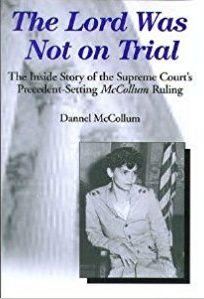
By George B. Kauffman
The Lord Was Not on Trial: The Inside Story of the Supreme Court’s Precedent-Setting McCollum Ruling. By Dannel McCollum, Americans for Religious Liberty, Box 6656, Silver Spring, MD 20196, 2008, xvii + 250 pp., paperback, $18.00.
One of the big differences between public schools in the United States and most European countries is that in the United States children’s religious education is left in the hands of the parents and religious communities rather than the public schools. The 1948 McCollum decision was a major step ensuring that public schools are not in the business of deciding which religious beliefs should be favored in the schools. This book relates the inside story of the Supreme Court’s first ruling to find unconstitutional a practice involving religion and public education.
Vashti McCollum’s (1912–2006) suit was the first in which the Supreme Court decided that what local authorities were doing constituted an “establishment of religion” and thus under the ban of the First Amendment as applied to the states by the 14th Amendment. She had never felt comfortable with the atheist label, preferring the designation “rationalist” and “humanist.”
Vashti’s second son, Dannel (b. 1937), the author of this book, has written widely on education, conservation, local history and local, state and national public affairs. He has been active in causes such as civil rights, civil liberties, peace and conservation. His books include Your Life and Mine: Problems and Projects in Conservation: A Guide to the Big Vermilion System (with J. O. Smith) and Essays on the Historical Geography of Champaign County, Illinois. Now retired, He spends much of his time writing and running his 200-acre farm bordering the Big Vermilion River in east-central Illinois.
*****
George B. Kauffman, Ph.D., chemistry professor emeritus at Fresno State and a Guggenheim Fellow, is a recipient of the American Chemical Society’s George C. Pimentel Award in Chemical Education, the Helen M. Free Award for Public Outreach and the Award for Research at an Undergraduate Institution, and numerous domestic and international honors. In 2002 and 2011, he was appointed a Fellow of the American Association for the Advancement of Science and the American Chemical Society, respectively.
